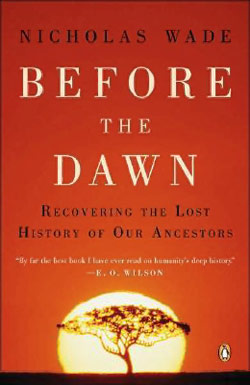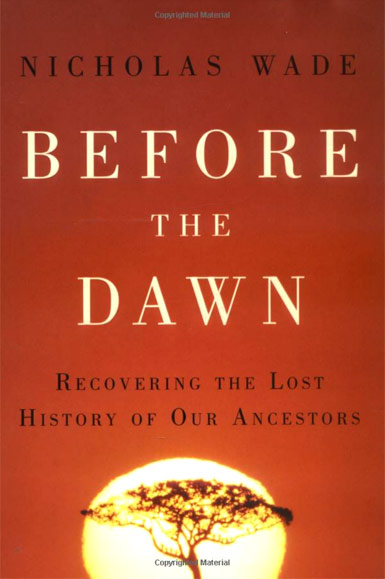
Book Review
Before the Dawn
Recovering the Lost History of Our Ancestors
Nicholas Wade
Paperback edition 2007
Recent discoveries have enabled us to answer such long-standing questions about human evolution as: What was the first human language like? How large were the first societies, and how warlike were they? When did our ancestors first leave Africa, and by what route did they leave?
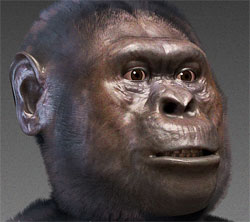
About 6.5 million to 5 million years ago, some 100,000 apes, the ancestors of today’s apes and humans, lived in East Africa in a forest shrinking due to climate cooling. There were two kinds of survivors of the climate change: one stayed with what was left of the forest and continued as before and it led to the chimpanzee; the other was the beginning of the human line, it survived by occupying the trees and the new spaces in between them. The human split from the chimpanzee occurred some 5-6 million years ago. These ancestors could survive in both terrains because of their critical new ability: to walk upright on two feet.
Bipedalism, Meat Eating, and Bigger Brains
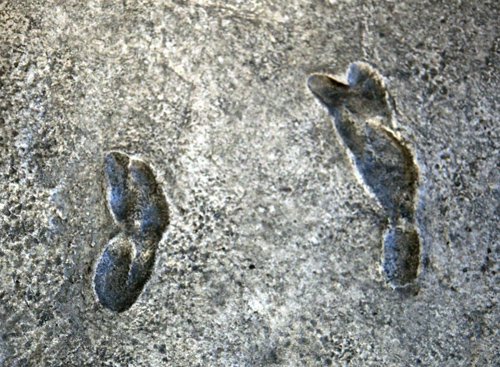
Australopithecines appeared about 4.4 million years ago. A haunting trace of their presence was found in a trail of footprints left about 3.5 million years ago at Laetoli in Tanzania. Two individuals walked in the ash from a nearby volcano, leaving behind their human-looking footprints in tracks that extend for 165 feet. They retained the long arms of the chimpanzee and could move in the trees, but their brains were slightly larger than the chimp’s, about 400 to 500 cubic centimeters. As with the apes, males were about 50% larger than females, suggesting that australopithecine society was like that of chimpanzees with a separate male and female hierarchy.
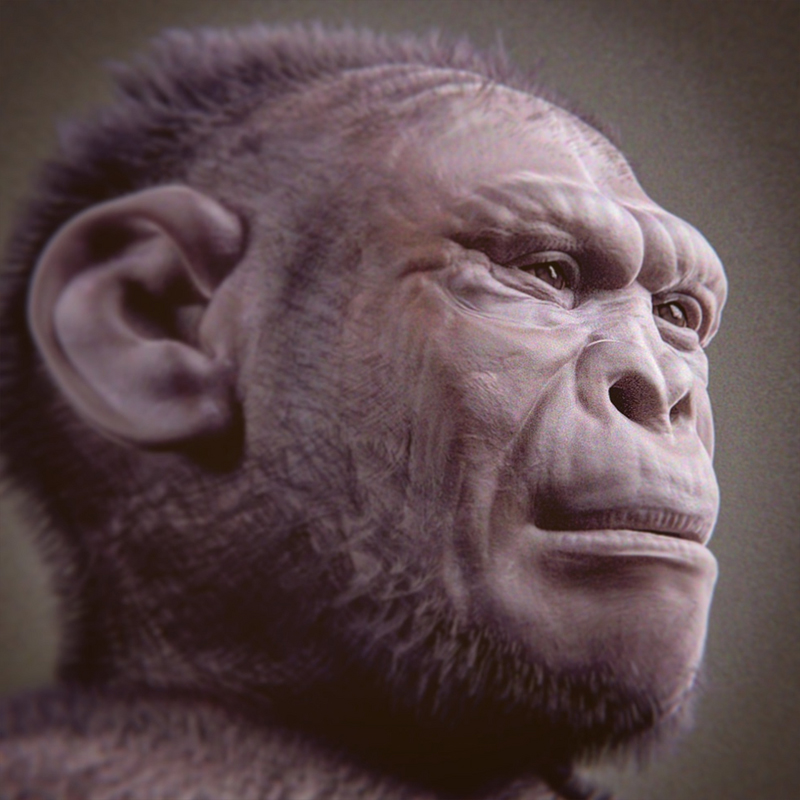
From 3 to 2 million years ago another cooling shrank the forests and many species living in them went extinct. By this time the australopithecines were adapted to open woodland, they and the other species each evolved different solutions for survival. The robust australopithecines evolved larger cheek teeth for eating coarse leaves.
The other, Homo habilis, evolved about 2.4 million years ago with smaller teeth, and as a scavenger of meat and bone marrow.
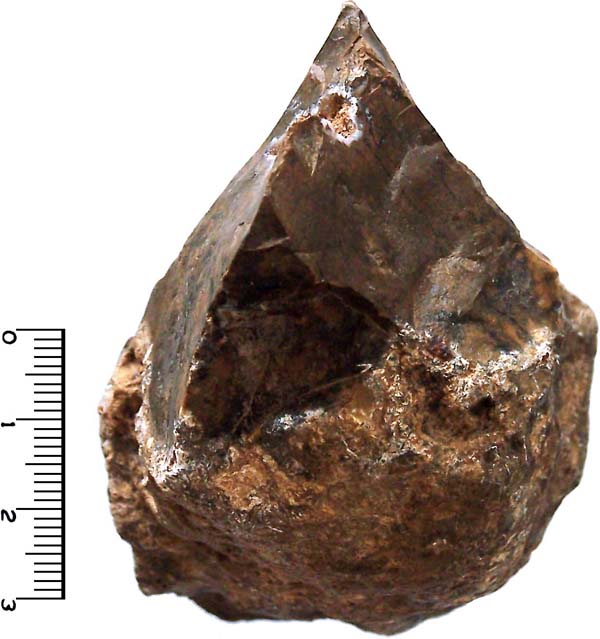
Meat-eating allowed for a smaller gut and jaw and also provided the nutrition that made possible a larger brain of 600 to 800 ccs. It’s fairly certain that habilis fashioned and used the primitive stone tools known as the Olduwan Industrial Complex, consisting of pebble cores and the rough flakes struck from them, that were first found with habilis remains in the Olduvai Gorge in eastern Africa.
Bipedalism and the beginning of a larger brain were two major steps in the process of changing the chimp-like ancestor into modern humans.
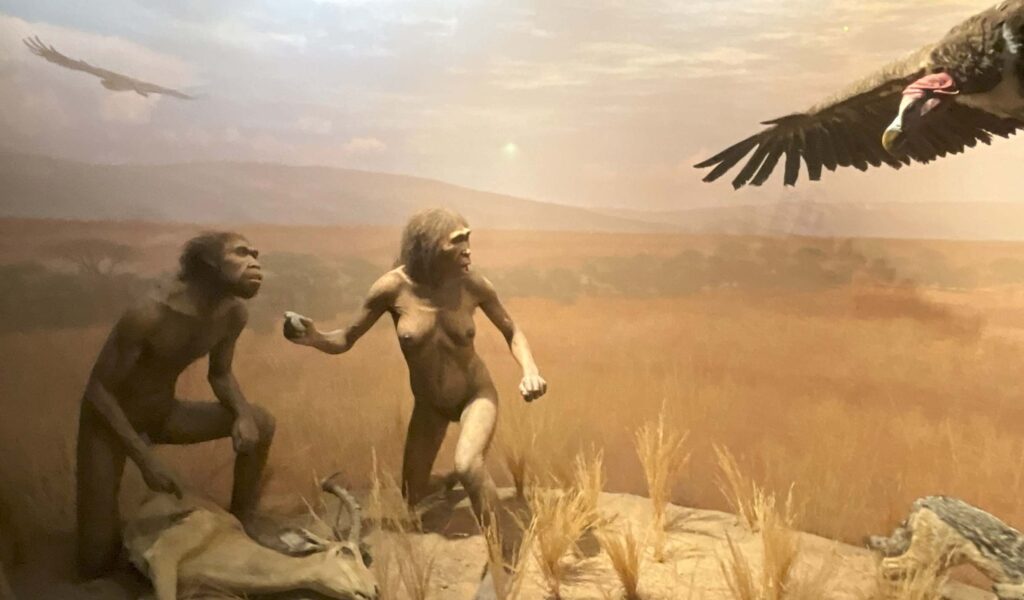
A third revolution occurred 1.7 million years ago in the form of a new species, Homo ergaster, whose skeleton shows most of the physical features of modern humans but whose brain measures about 800 ccs, which is below the modern capacity.
Ergaster’s arms were of human length, suggesting that it lived on the ground. The barrel-shaped chest and smaller stomach meant it ate a richer diet of meat and tubers. The sharp reduction in male-female size differences in ergaster is a transition from the apelike hierarchies to the start of a family structure in which males took some interest in protecting and feeding the mother of their children.
Although ergaster’s brain was only a bit larger than habilis’s, it was capable of sophisticated toolmaking. This Acheulian Industrial Tradition included the lozenge-shaped stones thought to be hand axes as well as cleavers and other large tools that may have been used for butchering, slitting hides, breaking bones, and woodworking.
Ergaster may have been the first of the human line to shed body hair. Human hairlessness may have come about when ergaster left the forest for the hot, dry savannah and evolved a way to cool the body and its larger brain. Sweating is an efficient way to achieve cooling but requires a naked skin.
Hairlessness, Light Skin, and the Role of Vitamin D
After a vital gene has become universal in a population, it accumulates “silent mutations” that do not significantly alter the gene and are not eliminated by natural selection. Silent mutations accumulate at a known rate, so that the number of them is a measure of the time elapsed since the last version of the gene swept through a population. Using this, geneticists calculate the latest version of the African receptor gene (the gene involved in synthesizing vitamin D) swept through the ancestral population 1.2 million years ago. The advantage of light skin at high latitudes is that it allows more sun absorption, leading to increased production of vitamin D3, necessary for calcium absorption and bone growth. The lighter skin of women at higher latitudes most likely results from the higher calcium needs of women during pregnancy and lactation.This development was an advantage for emigrants settling in northern climates who needed lighter skin for exposure to the weaker sunlight to synthesize enough vitamin D. Dark skin can lead to vitamin D deficiency which can cause fatal cancers affecting the colon, lung and prostate. Dark-skinned people are also at higher risk for rickets, cardiovascular disease, diabetes and multiple sclerosis.

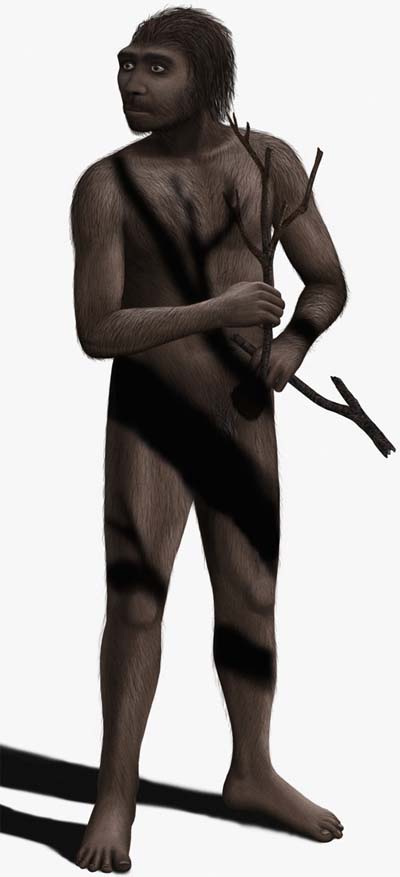
A close relative of ergaster, Homo erectus, reached Asia one million years or so ago, at approximately the same time ergaster reached both southern and northern Africa. By at least 500,000 years ago, our ancestors reached Europe, and these were perhaps descendents of ergaster. In Europe under glacial conditions, Homo heidelbergensis may have evolved into Homo neanderthalensis, a heavily boned, thickset people who adapted to the cold. Neanderthals are known as “archaic” humans to distinguish them from the lineage that remained in Africa and ultimately became modern. When the archaics left Africa, the human gene pool that remained eventually split into three main areas: Africa, Asia, and Europe. In Africa, our ancestors began to attain the skull size and skeleton of contemporary humans some 200,000 years ago, but as millennia passed, their behavior hardly altered. Their populations and social networks were small, and they seem neither to have hunted nor fished very much.
A profound change from the physically modern humans of 100,000 years ago to behaviorally modern humans in only 50,000 years was the result of a genetic revolution. Modern behavior appeared prominently in Upper Paleolithic Europe about 45,000 years ago. These people had a new set of carefully crafted tools made of stone, bone, antler and ivory; they adorned themselves with items made of ivory and shell, and fashioned flutes of bird bone. They were avid fishermen and hunters of large game, and had developed trade networks to obtain distant materials.
Paleoanthropology and archeology cannot provide information about the ancestral population of 50,000 years ago because this population vanished without a trace. Thus, until very recently, it was thought that no deep understanding could ever be gained about the five million years of evolution from primate to physically modern human and the 45,000 years of prehistory that followed this evolution. The physical evidence for this time is unearthed fossil bones, skulls and stone tools. Geneticists, however, following a genome trail that leads back in time can now fill in unexpected detail.
A good example of this is the genetic history of the louse and what its relationship with our ancestors has revealed. When our forebears were fully covered with hair, like any other primate, the louse was free to travel from head to toe. As our ancestors shed their body hair, the louse was left with only the hair on the head. In time the body louse branched off from the head louse and developed small claws that can grasp material rather than shafts of hair. Archaeologists couldn’t tell when the first clothes were worn because the materials were perishable. But since scientists can now calculate when the body louse evolved from the head louse—between approximately 83,000–150,000 years ago—we now have a date range for when our ancestors began to cover up. This coincides roughly with the time frame during which the ancestral population developed language and then eventually began to move out of Africa, ultimately colonizing the rest of the world.
Information in the genome allows human ancestries to be traced through the male Y chromosome, which is passed down essentially unchanged from one generation to the next with males assigned to different lineages based on the pattern of mutations carried on their Y chromosome. Surprisingly, human genes have continued to evolve until the present day and carry the marks of recent evolution in response to diseases, changes in diet and climate.
Evolution to Modern Humans
Fifty thousand years ago an ancestral population of about 150 members who are the forebears of modern humans left northeast Africa. Much of Africa had become depopulated from drought, and the ancestral group in Africa had dwindled to 5,000 members. The lands outside Africa were already occupied by archaic groups who had left Africa in one or more migrations 1.8 million years ago, during a warm period before the ice age began. These archaic groups had followed their own evolutionary development and became Homo erectus and Homo neanderthalensis. Erectus settled in East Asia, and the Neanderthals occupied Europe and, from time to time, parts of the Near East.
The Neanderthals were formidable with large brains and a brawny build. They had developed some heavy weapons, including stone-tipped thrusting spears. They occupied the southeast corner of the Mediterranean that included the area that is now Israel. The human lineages evolving in Africa appear to have tried many times to emigrate into this wider world but were unsuccessful because of the threat from these outside groups.
First Words: Genetics of Language
Primatologists have looked for the roots of language in apes and monkeys that have many of the neural systems needed to support language: a wide range of sounds and an acute sense of hearing and good cognitive processes, such as the ability to keep tabs on those close to them. So they’ve concentrated on teaching chimpanzees sign language. Chimps have complex thought processes—they know the position of each individual in their hierarchy or which individual must be recruited in a conspiracy. So chimpanzees can learn a number of signs for words.
A new line of inquiry about the origin of language was opened with the discovery of a gene involved in the fine aspects of language. The gene, FOXP2, shows no signs of having changed in chimps but has changed significantly in humans. The gene came to light when a geneticist discovered a London family of three generations in which 15 of its 37 members have a severe language deficit and a defective FOXP2 gene. Their speech is very difficult to understand; the problems include the inability to repeat the same word three times in a row or form the past tense of verbs and difficulties with writing.
FOXP2 swept through the population and became universal, and the latest update of this gene was fairly recent, sometime within the last 200,000 years. FOXP2 may have been the last gene added to the human language faculty, perhaps a final step in the development of modern human speech.
Eden: Our Genetic Roots in Africa
Between 60,000 and 40,000 years ago, Africa was depopulated by drought, and only in East Africa can archaeologists detect traces of a human presence. The total ancestral population shrank to only approximately 5,000 members that seem to have dispersed quickly through Africa and beyond. Close to 50,000 years ago, from this small group of people the entire world was populated, and they were probably the first to use a fully modern speech.

In tracing populations genetically, the two parts of the human genome that are particularly useful are the Y chromosome that only males possess and the mitochondrial DNA, both of which are not subject to the usual shuffling of genetic material. When an egg is fused with a sperm, all of the sperm’s mitochondria is destroyed. So the male’s mitochondria cannot be passed on to his offspring, only the female’s mitochondria passes unchanged to a child of either sex.
All males in the world today carry the same Y chromosome inherited from a male who belonged to the ancestral population, and both males and females carry a copy of the same mitochondrial DNA that belonged to a female of the ancestral population.
All males in the world today carry the same Y chromosome inherited from an ancestral male. Both males and females carry the same DNA from one ancestral female.
The physically modern humans of 100,000 years ago showed no signs of modern behavior, no apparent capacity for innovation, and may have lacked the faculty for speech. In the relatively brief span of 50,000 years that followed the evolution of physically modern humans, a form of click language developed and the pace of evolution picked up, especially in the brain. These developments gave rise to the ancestral modern human population that left its Eden in East Africa 50,000 years ago and entered the larger world beyond.
Exodus: Following the Genetic Tree
The genetic trees point to a single exodus from Africa about 60,000 years ago. Geneticists’ maps show arrows stretching from eastern Africa to India to Japan and Australia but the emigrants, of course, had no maps or any idea of what lay at the end of their migration. As new births swelled their numbers, the group would have divided to prevent the discord that emerges in large foraging populations. One group would remain and the other would move on to unclaimed territory. The emigrants likely kept to the coastlines and slowly spread to Arabia, India, Indonesia, the Far East, and reached Australia by boat around 50,000 years ago.
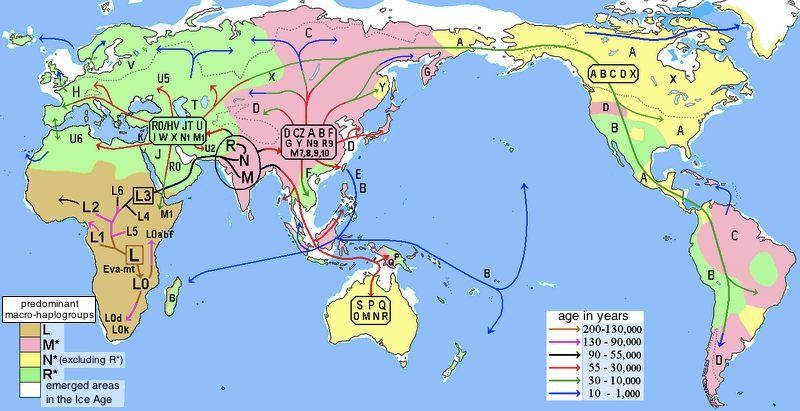
Periods of favorable climate may have drawn the Neanderthals down to the Levant and Arabia where they crushed earlier attempts by the physically modern humans to penetrate the Levant. By 50,000 years ago, however, the Neanderthals would have faced a different intruder in their area. Although physically weaker than the Neanderthals, the emigrants possessed language and likely had better organization and weaponry and finally gained an edge over their archaic relatives.
The Neanderthals did not yield easily. But by 30,000 years ago, they had disappeared from their last holdouts in the Iberian peninsula.
When the first humans left Africa, India was their first stop. In India also, there was an historic parting of the ways. Some continued along the coasts of Asia, eventually reaching Australia, China, and Japan. Others pushed inland through Iran and Turkey. Both paths tested the ability of these modern humans to innovate and survive in hostile surroundings, and the long contest with the Neanderthals for Europe began.
The modern humans expanded into new territories as the communities split. Year by year, the territory of the modern humans expanded and that of the Neanderthals shrank. The Neanderthals did not yield easily. But by 30,000 years ago, the Neanderthals had disappeared from their last holdouts in the Iberian Peninsula.
Stasis and Settlement
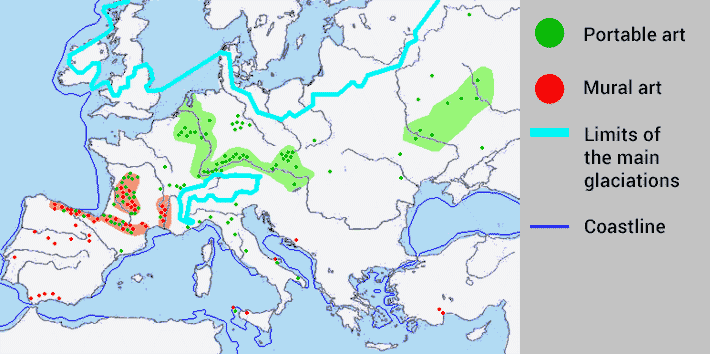
The development of settled societies from 50,000 to 15,000 years ago was an important transition, even though the precise road to settlement remains obscure. From about 45,000 years to 10,000 years ago the people of Europe and East Asia followed the same nomadic life and endured the same vicissitudes of climate. The vastness of Eurasia pushed people into separate trajectories. Because Europe’s archeology, languages, and genetics have so far received more attention that those of any other region of the world, Europe is the best place to follow the history of human foraging societies.
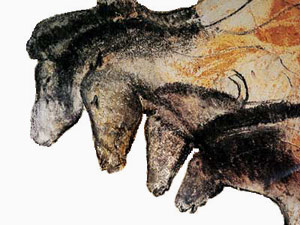
Stone tools differentiate a succession of European cultures. The earliest was the Aurignacion that lasted from 45,000 to 28,000 years ago, with tools found in France, Italy, and much of eastern Europe and in the Levant. Accomplished fighters, they steadily drove back the Neanderthals, although their culture was not purely martial. It included the remarkable artists who decorated the Chauvet cave in the Ardeche Valley of France, more than 30,000 years ago.
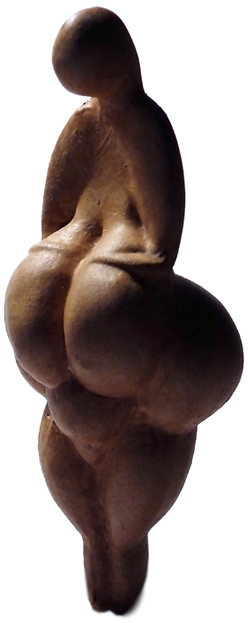
The cave was occupied from 32,000 to 30,000, and from 27,000 to 25,000 years ago. Paintings dominate the walls depicting lions, mammoths and rhinoceroses—animals that were rarely hunted—as well as horses, reindeer, and auroch. The beauty and expressiveness of the paintings often speak to contemporary observers, but their meaning and the intent of their makers is unknown. The Aurignacion period came to an end for unknown reasons, and its culture was replaced with that of the Gravettian, also defined by a distinctive set of tools.
Europe and much of the Eurasian steppes were covered in vast grasslands supporting abundant reindeer, mammoth, bison and antelope that provided abundant food for hunters and valuable materials like hide, bone, ivory, and antler. The Gravettian culture, which lasted from 28,000 to 21,000 years ago, stretched east into Russia with southern provinces in Italy and on the French-Spanish border and focused more on hunting mammoth than reindeer. These people produced the well-known Venus figurines recovered from sites that stretch from France to Russia and might have been associated with a fertility cult. Less well known is their invention of the bow.
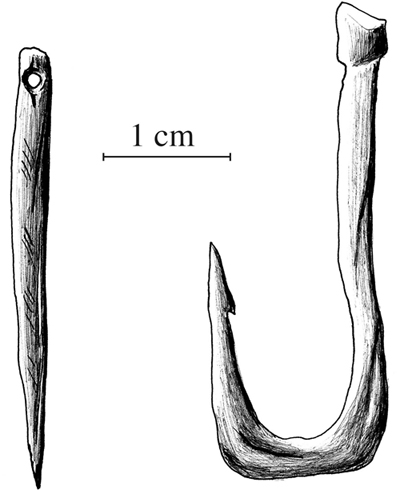
The Gravettians were followed by the Solutrean culture, which was centered in France and Spain and lasted from 21,000 to 16,500. The Solutrean toolkit includes the world’s first identifiable needles. These people had abandoned the worsening climate of cold northwestern and central Europe and were living together in larger societies that were crowded into these southern refuges.
As quickly as the glaciers had returned, they withdrew and yielded back the rich lands of Eurasia to animals and those who hunted them. People spread out across what is now France and Germany and created the culture of the Magdalenians that existed from 18,000 to 11,000 years ago. Their toolkit, designed for reindeer hunting, was lightweight and portable. Tools were crafted with particular precision and delicacy, such as bone harpoons with a row of barbs on each side, and the practice of cave-art continued at the Magdalenian sites of Lascaux, dated to 17,000 years ago, and Niaux and Altamira.
Agriculture stimulated a transformation of the entire forager society as they adjusted to a totally different set of societal values and meanings. Archaeologists have no hesitation in describing this transformation as a revolution.
People were also migrating out of East Asia. Groups from Siberia, crossing a land bridge that existed at the time, entered North America about 12,000 years ago and eventually created the Clovis culture on the Great Plains about 11,500 years ago. Over time they moved down the coast into the areas of Mexico, Central America and South America.
Or did they? Perhaps they entered the tip of South America first or there may have been three distinct migrations. An archeological site in southern Chile turned up artifacts that dated 12,500 years ago, with a deeper site underneath that was dated 33,000 years ago. Mitochondrial DNA analysis gave support to pre-Clovis dates of settlement at approximately 30,000 years ago.
Settling down or sedentism as archeologists call it may sound simple, but for foragers the choice was not so clear. Sedentism anchored people to a single exposed place, possibly vulnerable to intruders, and disease. But once people were settled, new opportunities for innovation opened up in technology, trade, warfare, and political organization. Agriculture stimulated a transformation of the entire forager society as they adjusted to a totally different set of societal values and meanings. Archeologists have no hesitation in describing this transformation as a revolution.
Human nature has probably changed in significant ways in the past 50,000 years. But it has not changed profoundly because its principal characteristics are much the same around the world, thus all of us inherit from a single source. Any characteristic with a genetic basis can vary, however, and is likely to do so, because so few genes remain constant for long periods of time.
The Genetic Template of Our Social Behavior
What is it that knits human societies together in the first place? Human social behavior is rooted in a genetic template adapted to prevailing circumstances. It includes a vigorous expansion of the chimpanzee propensity for territorial defense and aggression. But it also includes different behaviors, which enable people to work effectively with others in complex societies. In chimpanzee groups, most of the males are related to one another, a kinship that holds them together. Humans allow strangers to be treated as kin which provides the glue for large and civilized societies.
Humans allow strangers to be treated as kin which provides the glue for large and civilized societies.
In chimpanzee groups the male is dominant, and the female tends to live separately with her offspring. A chimpanzee community never assembles together as a whole. They move around in bands of 20 or more with a shifting membership. The females often feed alone with their offspring. Human family units require a higher level of trust among males, enabling them to band together for social purposes like warfare, with a reasonable degree of confidence that other males will not steal their wives.
Human family units require a higher level of trust among males, enabling them to band together for social purposes like warfare, with reasonable confidence that other males will not steal their wives.
All chimp communities habitually use tools but their use varies in the different communities. For example, in the forests of the Ivory Coast chimps use stones as hammers to open nuts, but Gombe’s chimps have never learned or invented this useful procedure.
No tool use has been observed among bonobos. Some additional differences between bonobos and chimpanzees, who look very much alike in appearance, are the separate female hierarchies that dominate bonobo groups and the penchant of bonobos to use sex, not only for reproduction, but also as a social greeting and reconciliation technique.
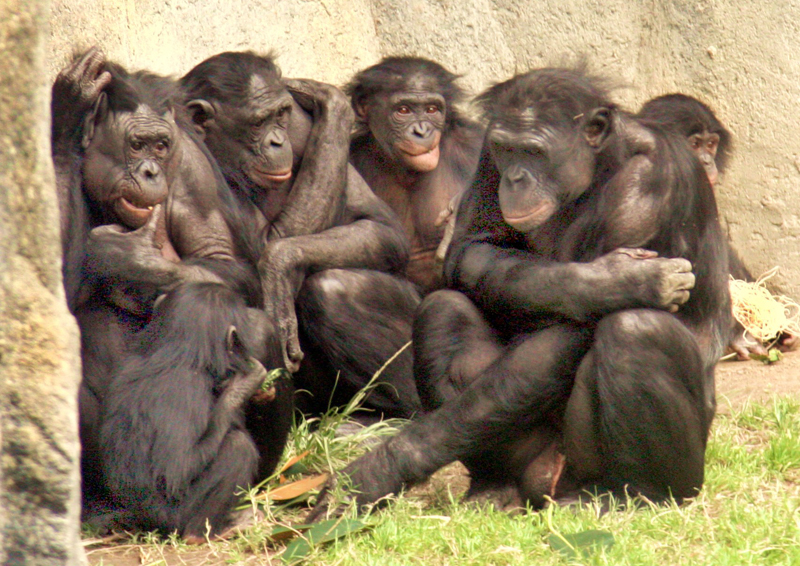
It seems more likely that bonobos descended from chimpanzees rather than the other way around. Since both are descended from the joint ancestor of chimps and humans, the joint ancestor presumably had both chimp-like and bonobo-like traits that may indicate where humans came by their contradictory impulses of aggression and conciliation.
Although warfare is a distinctive feature of human history, it tends to overshadow a more remarkable feature of human societies. The unique human ability to cooperate with others, especially unrelated individuals, is the opposite of warfare. This uniquely human blend of sociality that has evolved over time came about through a major shift from ape sociality to the human nuclear family, which gave all males a chance of procreation.

Trust is an essential part of the social glue that binds people together. Exchange and trade depend on trust, treating strangers as if they were family. Without this, human societies would still consist of small family units and cities and civilization couldn’t exist. Two hormones, oxytocin and vasopressin, modulate social behaviors. The hormones are generated in the pituitary gland at the base of the brain and have effects both on the body and the brain. They seems to be essential for appropriate and beneficial social interactions, play a very important role in maternal care and closeness, promote general trust and cooperation and prolong social memory.
The emergence of the male-female bond changed human societies. The willingness of the male to protect the female and her offspring was based on the female’s willingness to bear only his children and this allowed the necessary behaviors that have developed since then to support the male-female bond.
The emergence of the male-female bond changed human societies.
The evidence that human tribes became less murderously hostile to one another lies in a world-wide thinning, or gracilization, of the human skull that occurred during the Upper Paleolithic age. The fossils of early modern human skulls are large and thick-boned, but early modern skulls began to become more gracile about 40,000 years ago. With our bones more gracile than those of our Upper Paleolithic ancestors, our personalities less aggressive, and our societies more trusting and cohesive, a preference for negotiation over annihilation was injected into the genome.
In parallel with social evolution, the human physical form continued to evolve across the different continents. The distance between the populations as well as a general hostility did not allow for significant gene flow. For these reasons, the people on different continents followed independent evolutionary paths that led over the generations to the emergence of a variety of human adaptations, skin color, eye folds, hair, etc.
Language
Linguists estimate there are 6,000 languages around the world, all of them descendents of an older language no longer spoken. In a few cases, these parent languages have survived in written form, such as Latin, or can be reconstructed like proto-Indo-European, the inferred ancestor of a family of languages spoken from Europe to India. All of these languages are related, all are branches of a single family tree of human languages.
It is presumed that these branches converge at their trunk to a single language, perhaps the mother tongue of the ancestral human population. If this is the case, it should be possible to draw up a genealogy of the world’s languages that would demonstrate their tree of descent, a tree similar to the descent of the human races. If the tree of language could then be interwoven with the genetic tree of human descent a unified framework would be created for understanding human prehistory.
Within a language are dialects, often changing from village to village, that were likely even more pronounced in the days when people seldom traveled far from home. The English of Chaucer, after an interval of only 600 years, sounds foreign to modern English speakers.
That language has evolved to be local isn’t accidental. Given near-constant warfare between early human groups, a different language or dialect could identify strangers the moment they spoke. Dialects are difficult to learn, usually learned at a very young age, and change rather rapidly, which makes it possible to identify an individual not just within a locality but also within a generation.
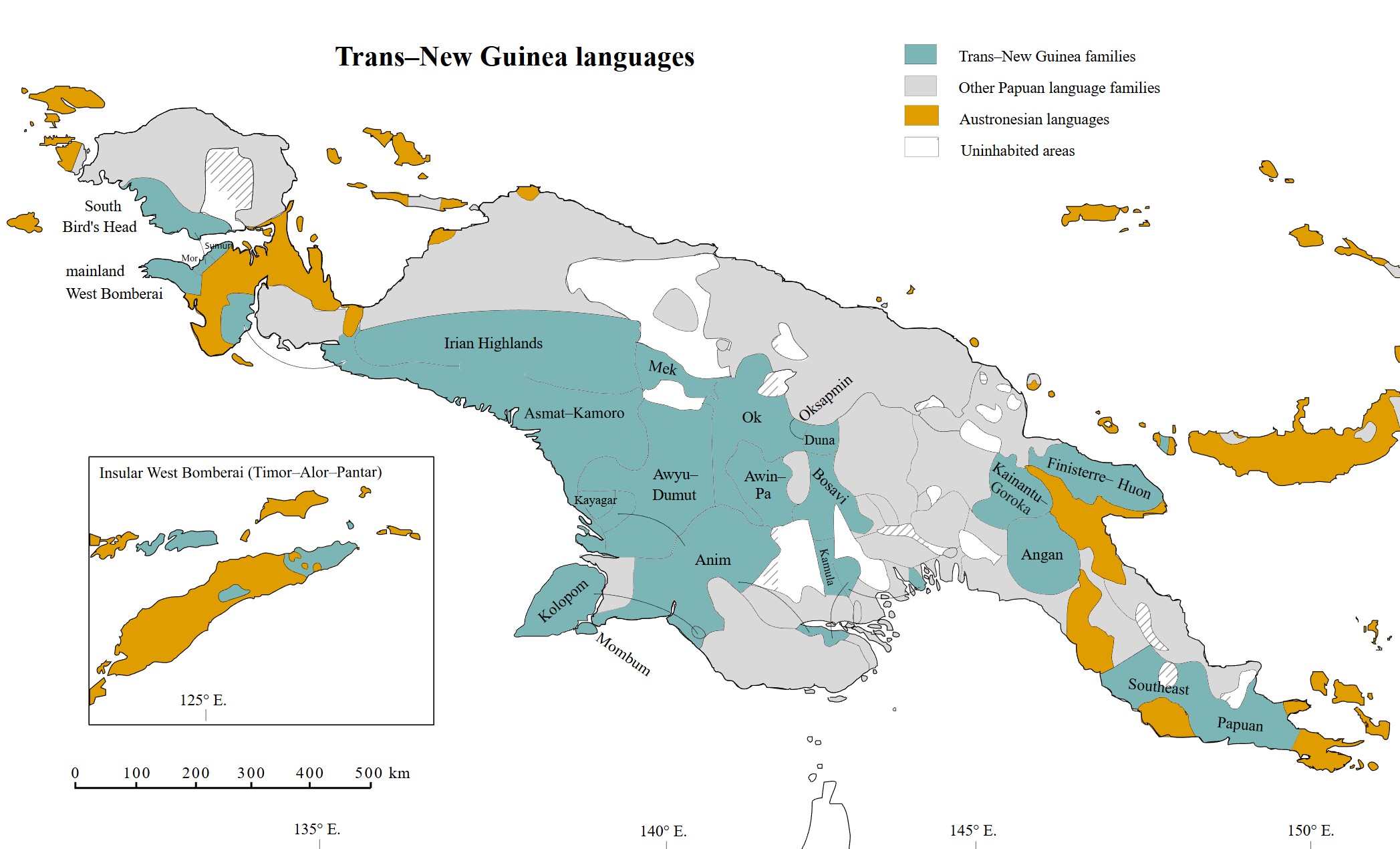
New Guinea has many languages because it has been stable for a very long time. Each of New Guinea’s 1,200 some languages is spoken on average by some 3,000 people living in 10 to 20 villages. Tribal competition as well as deeply forested mountains and valleys is one reason, the other is political fragmentation. Three factors that have shaped the island’s mosaic of languages are competition, the inability of any one language group to dominate the others, and a long period of time for diversification of language to occur.
The same process may have occurred worldwide after the ancestral humans left their homeland. Over the generations, an ancestral language would have broken down into a mosaic of divergent languages, the situation of the present world. It may be that the languages spoken in New Guinea and Australia are remnants of that ancient mosaic.
One of the implications of Darwin’s theory is that humans are the unplanned product of random processes. Compared to our cousins, the chimpanzees, humans look so much more advanced than they do, as though humans were shaped for a higher purpose. The evolutionary path of the chimpanzees required little change whereas the human lineage, seeking a way to survive beyond the trees, developed differently from the chimps because it was constantly forced to innovate.
Although evolution through natural selection depends on random processes, evolution is also shaped by the environment in which each species struggles to survive. For social species, the most important feature of the environment is their own society. The accumulating evidence from the human genome has brought to light the nature of the interactions between culture and evolution, indicating that human evolution is a continuing process during the past 50,000 years. To the extent humans have shaped their social environment, we have determined the conditions of our own evolution.
About the Book’s Author: Nicholas Wade is a British-born scientific reporter, editor and author who currently writes for the Science Times section of The New York Times. Wade was born in Aylesbury, England, and educated at Eton College and King’s College, Cambridge. He is the author of several books including The Nobel Duel, Betrayers of the Truth (co-authored with William J. Broad) and The Faith Instinct.
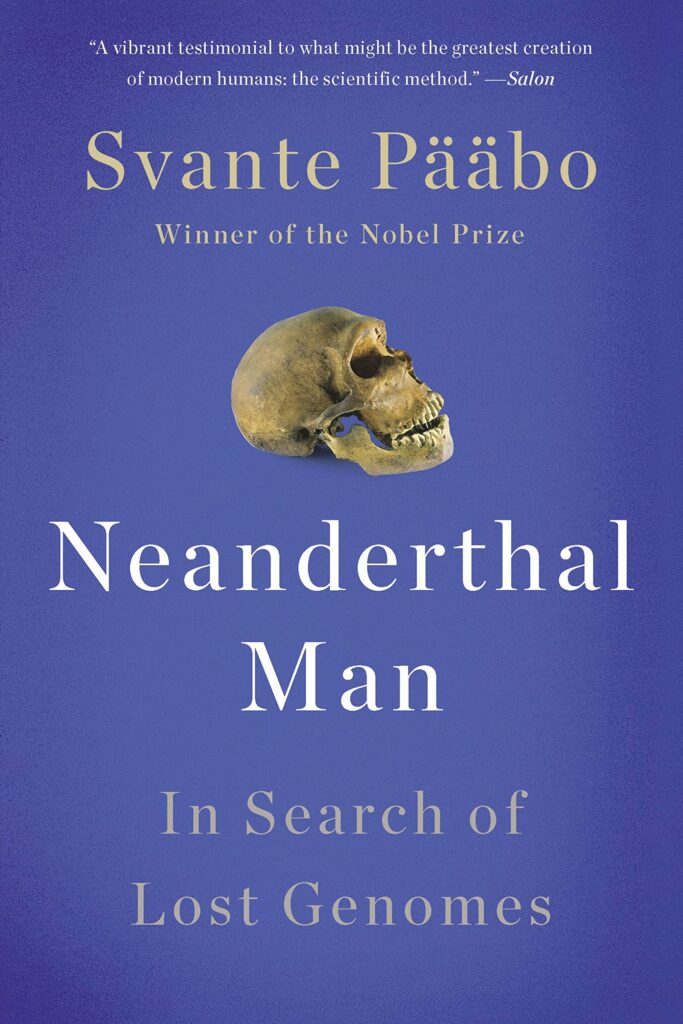
Neanderthal Man
In Search of Lost Genomes
By Svante Pääbo
Reviewed by George Kasabov
Neanderthals, our nearest cousin species, finally died out soon after 40,000 years ago. How are we related to them?
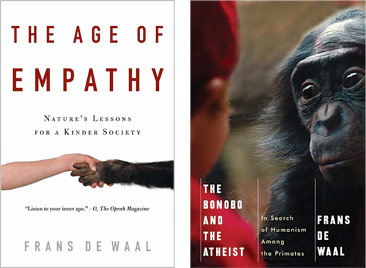
The Age of Empathy and The Bonobo and the Atheist
Frans de Waal
Both reciprocity and empathy – the two pillars upon which morality is built—are found in bonobos, apes and other social animals. But only humans are able to “abstract” the value and extend the behavioral constraints of “one-on-one” morality to the larger society, including strangers.
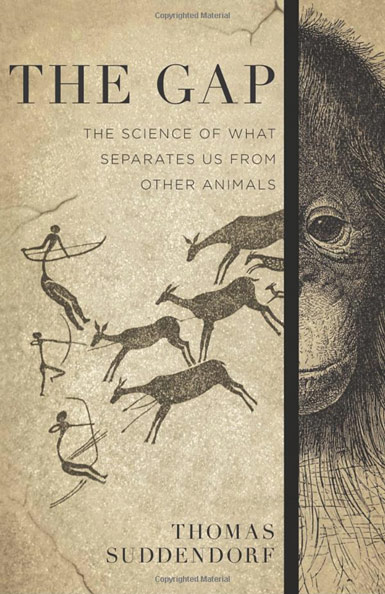
The Gap
The Science of What Separates Us from Other Animals
Thomas Suddendorf
A leading research psychologist concludes that our abilities surpass those of animals because our minds evolved two overarching qualities.
In the series: Our Prehistoric Ancestors
- Genetics and Human Evolution
- Our Nearest Relatives: Bonobos and Chimpanzees
- Our Hominid Predecessors
- She Has Her Mother’s Laugh
- Neanderthal Man – In Search of Lost Genomes
- The Evolution of Human Morality: The Age of Empathy and The Bonobo and the Atheist
- The Gap: The Science of What Separates Us from Other Animals
- Before the Dawn: New details of human evolution revealed
Related articles:
Further Reading »
External Stories and Videos
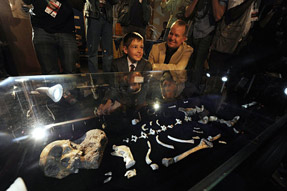
New Fossils May Redraw Human Ancestry
Nicholas Wade, The New York Times
An apelike creature with human features, whose fossil bones were discovered in a South African cave, is being greeted by paleoanthropologists as a likely watershed in the understanding of human evolution.
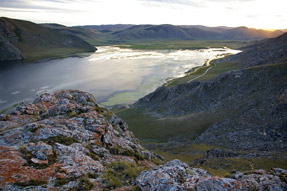
24,000-Year-Old Body Shows Kinship to Europeans and American Indians
Nicholas Wade, New York Times
The genome of a young boy buried at Mal’ta near Lake Baikal in eastern Siberia some 24,000 years ago has turned out to hold two surprises for anthropologists.
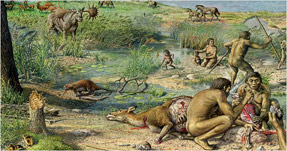
Clues of Britain’s First Humans
Nicholas Wade, New York Times
The genome of a young boy buried at Mal’ta near Lake Baikal in eastern Siberia some 24,000 years ago has turned out to hold two surprises for anthropologists.

Study Finds Humans Still Evolving, and Quickly
Karen Kaplan, Los Angeles Times
The pace of human evolution has been increasing at a rate 100 times faster than when our ancestors first began spreading through Europe, Asia, and Africa 40,000 years ago.

